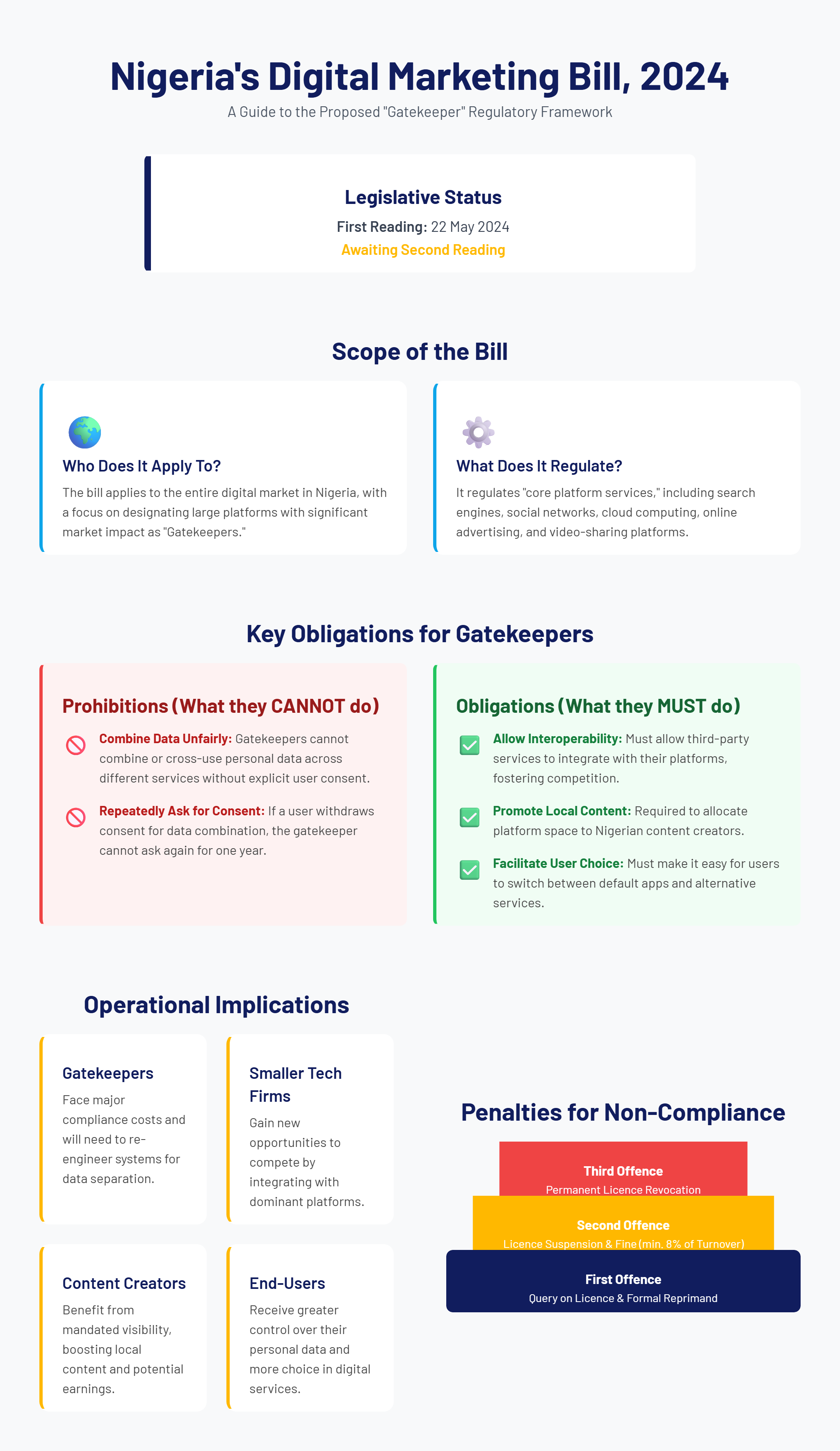

Introduction
Nigeria is introducing a significant regulatory framework for its digital economy with the proposed Digital Marketing Regulation Bill, 2024. The bill aims to create a structured environment for digital marketing and related services by introducing a "gatekeeper" regime, modelled closely on the European Union's Digital Markets Act (DMA). It seeks to address competition issues, protect consumers, and promote local content by imposing a set of clear obligations on major digital platforms operating in the country.
Legislative Status
The Digital Marketing Regulation Bill, 2024, was introduced for its first reading in the House of Representatives on 22 May 2024. It is currently awaiting its second reading.
Scope and Application
The bill applies broadly to the entire digital market operating within Nigeria, including on any Nigerian-registered ship or aircraft. Its core focus is on regulating "core platform services," which include online intermediation services, search engines, social networks, video-sharing platforms, cloud computing, and online advertising services. The central concept of the bill is the "gatekeeper," an undertaking that has a significant market impact and serves as an important gateway for business users to reach end-users.
Regulatory Oversight and the Gatekeeper Regime
The Nigerian Communications Commission (NCC) is designated as the primary regulator responsible for enforcing the bill. Its key powers include:
An undertaking is presumed to be a gatekeeper if it meets certain thresholds, such as achieving an annual turnover of N5 billion or more in the last three financial years while also providing the same core platform service in another West African country, and having at least 10 million monthly active end-users in West Africa. Even if these thresholds are not met, the NCC can still designate a company as a gatekeeper based on qualitative factors, such as its size, market position, network effects, and data-driven advantages.
Key Obligations for Gatekeepers
Once designated, a gatekeeper must comply with a series of obligations aimed at ensuring fair competition and user choice. These include prohibitions and affirmative duties:
Prohibitions
Affirmative Obligations
Intersection with Existing Advertising Framework (ARCON Act)
The bill introduces a new layer of regulation that will directly interact with the existing framework governed by the Advertising Regulatory Council of Nigeria (ARCON) Act, 2022. This creates both potential for conflict and opportunities for synergy
ARCON has a broad mandate to regulate all forms of advertising, including digital and online advertising. The ARCON Act and the Nigerian Code of Advertising require pre-approval for all advertisements before they are published or broadcast to the public. The Digital Marketing Bill, by granting the NCC authority to supervise "digital marketing exchanges" and issue licences, creates a clear jurisdictional overlap. It is unclear how the NCC's ex-ante regulation of gatekeepers will align with ARCON's existing pre-vetting process for individual advertisements. This could lead to a situation where a digital platform is licensed by the NCC, but the advertisements it carries are still subject to separate approval by ARCON, creating a dual-layered and potentially conflicting compliance burden.
On the other hand, the two frameworks can be seen as complementary. ARCON’s focus is primarily on the content of advertisements—ensuring they are legal, decent, and truthful. The bill focuses on the market structure, addressing the conduct of dominant platforms to ensure fair competition. The data protection obligations in the bill, for example, reinforce the data protection principles outlined in ARCON’s Code of Advertising. If the two regulators collaborate effectively, they could create a comprehensive regulatory ecosystem that addresses both market power and advertising content.
Practical Implications for the Ecosystem
The bill's introduction is set to have far-reaching effects on various stakeholders in Nigeria's digital economy:
Penalties for Non-Compliance
The bill introduces a stringent, tiered penalty system for gatekeepers that fail to comply with their obligations:
Conclusion: A Step Fraught with Implementation Challenges
The bill is an ambitious legislation concerning digital markets. However, its success is far from guaranteed. The designation of a new, powerful regulator in the NCC for digital markets raises significant concerns about jurisdictional clarity, particularly in relation to ARCON. Without a clear mechanism for harmonising their functions, businesses may find themselves caught between conflicting regulatory demands, leading to legal uncertainty and increased compliance costs.
More fundamentally, the bill's design presents two critical risks. Firstly, its focus on regulating specific "core platform services" risks falling into the classic trap of technology-specific legislation. Digital markets are dynamic and fluid; a regulatory framework tied to a fixed list of technologies is likely to become quickly outdated. Secondly, by concentrating exclusively on high-turnover "gatekeepers," the bill may inadvertently create a regulatory blind spot. This approach risks ignoring smaller, niche platforms where significant user harm and anti-competitive practices can still fester, a lesson learned from past failures in online safety regulation globally. A more resilient, future-proof approach would focus on regulating anti-competitive outcomes and harmful conduct across the entire market, regardless of the platform's size or the specific technology used.